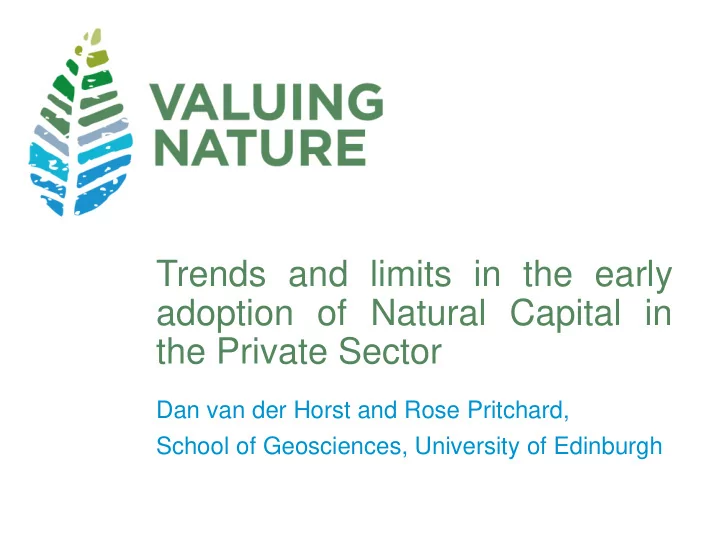

Trends and limits in the early adoption of Natural Capital in the Private Sector Dan van der Horst and Rose Pritchard, School of Geosciences, University of Edinburgh
Background • We are beginning to see increased interest in the idea of natural capital accounting in the private sector, despite this sector often being perceived as ‘hard to reach.’ • It is important to understand the adoption pathways taken by early adopting businesses, from initial motivations through to business and environmental outcomes, in order to identify knowledge and capacity gaps which currently constrain the uptake of natural capital accounting.
Objectives • We will deliver a POSTnote on the early adoption of natural capital accounting by businesses, addressing the following key points: • The scope of current private sector engagement with natural capital accounting. • The rationales behind early adoption of natural capital accounting and the associated choice of natural capital metrics. • The challenges encountered by early adopting businesses and the additional research or training required to ameliorate these.
Overview 29 th January to 9 th February: Compilation of case study literature and identification of key informants. 9 th February to 9 th March: Analysis of case study literature (quantitative and qualitative) and key informant interviews. 9 th March to 31 st March : POSTnote written with input from key informants and early adopting businesses.
Stage 1: Compiling case study literature • Relevant academic literature identified through WoK, SCOPUS and Google Scholar. • Business reports and grey literature identified through contact with existing networks of businesses engaged in NC accounting (e.g. Cambridge Natural Capital Impact Group, World Forum on Natural Capital). • Contact with existing networks will also help with identification of key informants and encourage business engagement with the report from an early stage.
Stage 2: Analysis of literature and interviews • Quantitative content analysis mapping motivations and accounting methods over time, by location and by business sector. • Qualitative thematic analysis of case study literature exploring accounting adoption pathways, the success of accounting methods adopted from business and sustainability perspectives, and the challenges faced by early adopting businesses. • Collation and analysis of key informant interviews, to triangulate literature analyses and to explore whether discrepancies exist between narratives found in case study literature and real-world business practice.
Stage 3: Collaborative report writing • POSTnote drafted and circulated to key informants for feedback and revisions. • Priority areas identified for policy change, capacity building and future research.
Any questions? Dan van der Horst (dan.vanderhorst@ed.ac.uk) Rose Pritchard (r.c.pritchard@sms.ed.ac.uk)
Recommend
More recommend